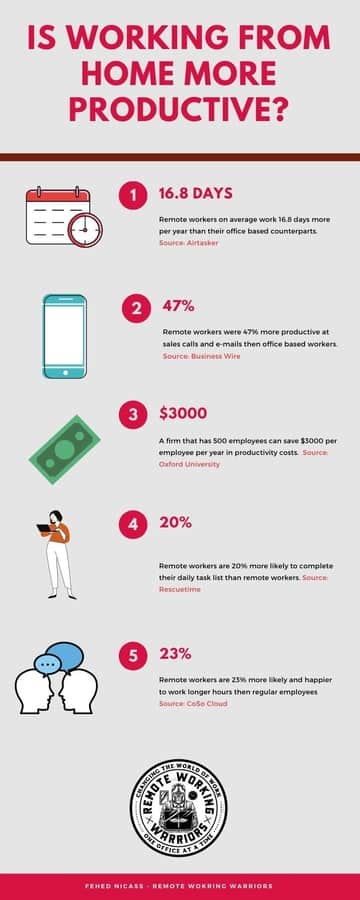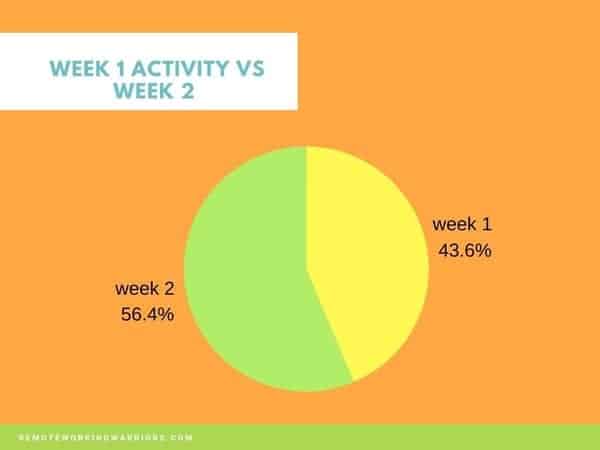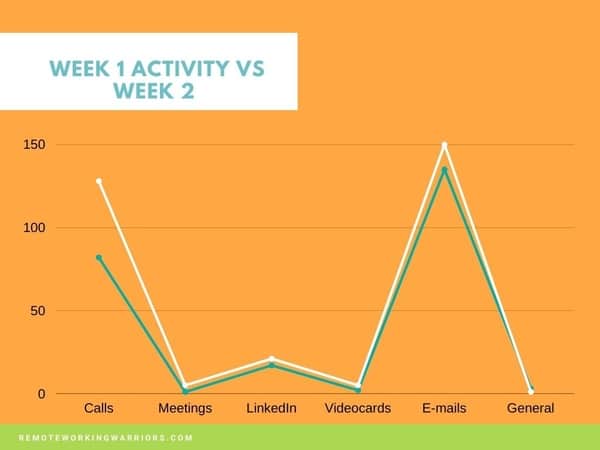This website is supported by its readers. If you click one of my links I may earn a commission. I am also a participant in the Amazon affiliates programme and I will also earn a commission from qualified purchases.

Working from home, Remote working. I dunno about you but having the opportunity to beat the commute and get up 2 minutes before starting my work day definitely brings a smile to my face. That being said there is a bit of a stigma that working from home can lead to less productive employees, with some managers refusing to let their staff do so.
People who work from home are more productive then people who work in an office. Remote workers on average work 16.8 days per year more than their office based counterparts. This averages out to 1.4 days extra per month. A recent study has also shown that remote workers’ productivity is up 47% more than last year, meaning as time goes on remote workers are also getting more efficient.
So do these statistics add up to real time productivity for remote workers? And how can you stay more productive when working remotely? Keep reading to find out more.
(Just a heads up a lot of people reading my blog are in the process of designing their own home office. If you want to save some of the painstaking time I did in designing my office, you can find my recommended products here)
Is working from home more productive?
In a nutshell, yes, but let me explain.
For any long time readers of my blog you know that part of the reason that I set it up was because I moved from working remotely 1-2 days a week to becoming a full fledged remote worker. As you can imagine at the beginning there was definitely a little bit of panic going on but a few months in and it has become my new normal.
Like many of you, one of my biggest concerns was productivity. I mean let’s face it managers are much more likely to cut people who aren’t in the office the people they see on a day to day basis, so I couldn’t afford to slip on my workload.
The first thing I did was ready as many studies as I could on remote working and luckily enough for you, I’ve collated them together below:
| Study | Findings |
| Airtasker Study | Remote workers on average work 16.8 days more per year or 1.4 days more per month then their office based counterparts. This Means they work an average of 134 hours more over the course of a year then other employees which is huge |
| Business wire | Remote workers are 47% more productive year on year e-mailing, Making calls and using CRM platforms (this study was focused on sales roles |
| CoSo Cloud | Remote workers are 52% less likely to take time off work and 77% of them believe they are more productive when they work from home. 23% of remote workers are willing to work longer hours |
| Flex Jobs | 66% of remote workers feel as though they are more productive when they work remotely |
| IT World | 71% of employers feel as though they get better quality work from their employees who work remotely . 70% of employers trust their employees to work remotely |
| Stanford Business School | A trial of call centre workers who were temporarily allowed to work remotely found that they were 13% more productive then usually when working from home |
| Gallup | A 500 employee company can save $3000 per year per employee in productivity costs. |
| Forbes | Remote workers are 87% more likely to love their job than normal office workers. This is good as happier workers are almost always more productive ( oxford University study) |
| HBR | Remote workers do 13.5% more call based activity than office workers. |
| Rescuetime | Remote workers are 20% more likely than office workers to complete their daily tasks |
Hopefully these studies will make you feel at ease knowing that the science is on your side.
Remote working productivity studies
Now as you can probably tell from the table above, that’s a lot of content to run through.
The good news is that all the studies show that in almost every scenario (apart from socialising and loneliness) working remotely will definitely be more productive than working for an office based environment., To help break down the table even more I’ve put the information together in an infographic:

Remote working productivity by task
So now that we know working from home is definitely more productive than working from an office, what about the individual tasks?
Are there certain tasks that people are better at doing from home then an office based environment? Are there things that us remote workers do less than their office based counterparts
Commute
Easily the fastest place remote workers will gain productivity gains will be in the commute.
The average one way commute for someone in the US is about 26 minutes for a one way trip or an hour per day. This averages out to around 200 hours per year that remote workers don’t have to worry about.
Now you might be thinking, is this time really gained back? I mean aren’t remote workers just sleeping in? Truth be told (for myself at least) us remote workers tend to still get up around the same time and even start work earlier, so the time gained in commuting is often time gained working too.
Meetings
Meetings can be the bane of many of our lives with a lot of wasted time we could claim back actually, you know, doing our day jobs.It’s not just me that thinks so with Doodles state of meeting report showing firms will lose upwards of $399 billion in poorly organised meetings per year.
Yup, you read that right, that’s billions with a b.
The good news is that remote workers often spend less time in meetings then traditional workers who can spend up to 23 hours per week in meetings.
Calls and day to day work
So you know I had to include this on the list.
Most of you know that I work in sales and such time on the phone with prospects is going to be vital to my success.
Rescutime recently did a study, breaking down time spent communicating internally in comparison with doing core activities.
Core activity essentially means your day to day responsibilities and what your job description entitled (as a salesperson this could mean drafting external calls and emails.)
The surprising news was that remote workers both tend to do more core work and less communicate internally meaning their time is much better spent on the tasks that give them the best amount of results.
Talk about paretos law!
Remote workers tend to do more core work and finish off their tasks lists more so then office based employees
My experiment on working from home productivity
So if you’re anything like me, a lot of these studies seem a little bit foreign to you. I mean just because a few studies have found that you are more productive doesn’t necessarily you will be right.
What’s the old saying correlation does not equal causation?
At the end of the day a lot of the studies you and I have both come across are based questionnaires. Instead of setting up conditions where people can track their work they are usually just answering a survey, which at the best of the time can be very easy to influence.
As such, I thought it would be great to set up my own 2 week study on working from home productivity.
What role did I do my study on?
Before we go into how I set up my study, we need to talk about what my day to day role is.
I currently work in sales. Now whilst some sales roles often find you not being in control of your schedule, having paid my dues in the world of business development consultancy. Account executive roles My current role is that of a business development rep aka a sales rep.
This means that unlike other sales roles I don’t necessarily need to be out visiting clients instead my role is mainly focused on calling and making first contact with clients.
This means typically week in week out I can do the same activities and monitor my activity level.
How did I set up my study?
I decided to set up my study over a two week period, Week one would be based in the London head office of my firm. I would stay over at a friend’s house and arrive there on a Sunday to ensure I did not waste any time travelling on a Sunday and would leave after work 5 pm on a Friday.
Week 2 would be based entirely at home, I would work for the exact same amount of time as I would normally instead of taking breaks away from my office day.
I would track all of my day to day activities in a CRM platform ( Salesforce). On top of this, I chose to do this in the weeks that were identical to one another, so the same amounts of meetings, no external distractions like big events or days when the organisation had special activities taking place.
What does a typical week look like
So the key KPIs of my role consists of picking up 6 leads from our research team per week, hammering out 200 activities split typically 50/50 between calls and e-mails.
I would also have to do other activities that would not usually be tracked via SF such as recording videos for prospects. Another area I would need to track would be activities I would get around to if I had spare time such as posting on LinkedIn or coaching calls.
The main metrics then we will be:
- Number of leads picked up
- Total numbers of calls/emails/ activity completed per week
- Numbers of meetings booked
- Calls coached
- Posts on LinkedIn
The results
Week 1 – working from an office
| Metric | Number of activities completed |
| Number of Leads picked up | 5 |
| total numbers of calls/emails/Li messages activity completed per week | 240 |
| Numbers of meetings booked | 1 |
| Calls Coached | 1 |
| Posts on Linkedin | 1 |
So this week was a bit of a mixed bag. Whilst I managed to have a much higher number of activities completed then I thought I would have I was a little bit disappointed by the number of Meetings booked vs the number of calls. Also the week as a whole was quite quiet and yet I only managed to coach one LI post.
The break down of activity for the 240 activities where as follows:
- 82 calls completed
- 1 meeting booked
- 17 Linkedin in mails sent
- 2 video cards sent out
- 135 e-mails sent
- 3 general task follow ups
Week 2 – working from home
| Metric | Number of activities completed |
| Number of Leads picked up | 7 |
| total numbers of calls/emails/Li messages activity completed per week | 310 |
| Numbers of meetings booked | 5 |
| Calls Coached | 4 |
| Posts on LinkedIn | 3 |
A much stronger week in week 2 of the experiment when working from home. Not only did my booking ration exceed( this is typically 1 meeting booked per 100 activities) but I also had more time to coach more calls and build up my social branding via LinkedIn.
The break down of activity for the 310 activities were as follows
- 128 calls completed
- 5 meetings booked
- 21 Linkedin inmails sent
- 5 video cards sent out
- 150 e-mails sent
- 1 general task follow up
What do these results mean
To cut to the chase, The results of my study show that for my sales role at least, over the period of a short time scale of two weeks working from home is unequivocally more productive than working from home in an office environment.
Now I appreciate that there is a lot of data to break down and visualise the most important parts of the data I’ve pulled together a few graphs below:


Are there any downsides to my study?
So whilst many study fell in line with all the other studies on being more productive there are some things we should keep in mind:
- My study was only done over a 2 week period so the long term effects of working from home will not be present
- I have a dedicated home office space and have no kids to live with so I wasn’t getting distracted when working from home
- My role does not require me to have a lot of meeting s and check in with my colleagues that much, on top of this my sales role can be quite different from other in the sales field so I have no idea how these results would translate to other job types such as Accounting or engineering roles.
- I was able to track all of my sales activity via Salesforce, A lot of people don’t have any CRM platform to actively manage their workloads,if you were to do this manually I’m sure you were bound to make human error
- To make the study more accurate I could have used screen capture tools to see if I spend more or less time procrastinating on specific sites when working remotely.
Hopefully though my study has given you a bit of insight and if you have the time and ability to do so I would definitely recommend you do the same and undertake your own study.
You never know, you might find that you are nowhere near as productive when working from home and it can help you view what exactly is taking up most of your day.
How to be more productive when working from home?
Now that we know working from home can be more productive than working in an office based environment, what are some of the steps I took during the study to ensure I was staying focused throughout the day.
How can you stay more productive when working from home? The following 20 steps will help you keep focused:
Set up a dedicated office space
Easily the best thing to do to stay productive when working from home is setting up a home office. Having a dedicated office space will work wonders to keep you focused and set up the barriers between your work life and a personal life.
So how do you set up a home office as a beginner? Well luckily enough I’ve set up a post that talks through beginners on this. The post also highlights the office products I recommend but you can find them all on my resource page too.
Ensure you have a strong internet connection
It’s a state of reality that almost all remote working jobs are now possible because of the internet, heck trying to do my job 10 years ago would have been almost impossible.
That being said, a sure fire way for me to stop working from home is a dodgy internet connection. Let’s face it, the slow internet means less getting done.
For example my role in sales requires me to make calls via voip systems.
If my internet cuts out, it can really throw a dampener on prospecting clients so potentially invest in a wifi booster to help (my own personal favourite which doesn’t break the bank can be found here, it’s super easy to set up and doesn’t take up too much room)
If you want to improve your internet connection you can do so with my recommended wifi booster.
Journal everyday
I know, I know, this one seems a little childish.
Whilst you don’t have to start every entry with a dear diary, journaling can be a great way to manage your day and stay productive.
For example, if you find that there are certain days of the week where you struggle to get work done or just can’t seem to think straight then journaling will help you find out the reason why.
Maybe you have a meeting every Wednesday and struggle to work afterwards or on a Tuesday night consistently you have bad sleep, journalling will definitely open your eyes and give you the data you need to get your time back.
Drink Three litres of water every day
According to the academy of Nutrition and dietetics drinking water is the best thing you can do to wake up in the morning, not coffee.
Why? Water keeps you hydrated and can help avoid mental fatigue linked to dehydration.
Drinking up to three litres per day will keep you alert and focused for the day ensuring that your productivity is focused throughout the day.
Work out first thing in the morning
So I don’t know about you but working out at the crack of dawn really gets you focused and set up for the rest of the day. You have a certain amount of willpower, and as the day goes on this slowly gets chipped away.
Not only will you be keeping healthy, you’ll also feel energised for the first few hours after working out. On top of this, sadly it’s easy to feel isolated when working from home so getting out of the house and getting some social time will only be good for you.
Divide your tasks into projects
Imagine logging into your computer and finding a list of about 150 tasks that you have to complete by the end of the day… pretty daunting right?
Breaking your tasks together into manageable projects using the pomodoro technique will help keep you focused for 90 minute chunks whilst taking the five minute breaks you need so you don’t feel burned out.
The Pomodoro technique is one of the most common and well known work patterns that helps keep people focused. Simply work for 25 minutes and take a 5 minute break. repeat in an hour and a half cycle.
Get dressed every morning
Similar to going to the gym first thing, getting dressed and showering first thing in the morning like you would when you were to go into the office is the best thing to do once again, win the day and get your mind set up.
Funny example, before I make sales calls I get dressed in smart casual clothes, helps get my perspective right and I almost always make better sales calls in professional garb then I would normally.
Keep track of your data
Without data you’re dead in the water.
I mean how can you manage your productivity without knowing how much work you’re getting done. You’ll be surprised at how many roles are not built for this so you need to find a way to do this.
This could be done via an excel doc or even using tracking tools built in to your machine like the screen tracker on macs.
This will give you a picture of how much time you spend on certain tasks and then focusing on the 20% of the activity that gives 80% of your outcome.
Eat a healthy diet
Anyone who has downed a triple cheeseburger ( as I regularly do) for lunch knows just how savage the post lunch crash can be. Having huge quantities of carbs and food can wreak havoc on your productivity and make you feel worse for wear.
The solution, fix up your diet.
Your insulin levels won’t bounce around so much if you look into things like intermittent fasting or eating more greens. As always speak to a doctor before any changes to your diet and exercise regime.
Touch base with your office base colleagues
If you work for a company that does not allow all it’s employees to work remotely then sooner or later jealousy will raise it’s ugly head.
Touching base with your colleagues can help avoid this and also give you the social time you need to avoid isolation. You will be surprised how after these video catch ups you will feel energised and actually get a fair bit done.
I usually find the first hour after these meetings are as productive as the first hours in the morning.
Don’t forget to socialise
Similar to the point above, getting some social time with friends and family will be huge. Why not make the most of your lunch break and pop out onto the shops, if you have time off work or finish early then spend time with your peers just to catch up.
Working from home can be lonely at the best of times so you need to make sure you get the facetime in.
Start a side hustle
So as If you didn’t have enough on your plate I decide to tell you to start a side hustle.
Doing this has easily been one of the most rewarding things I’ve done and has helped increase my productivity when working from home.
How? Well doing something you’re passionate about on the side (whether this is related to your role or not) can give you something to aim towards.
Most people who work from home are in charge of their calendars so let’s say if you’re able to complete all your work an hour early. That’s an hour you get back to work on your side hustle.
You can also use your day to day job to practice some of the learnings you have during your side hustles. My recommendation is what I currently do which is blogging. You can find out more about how I earn money here.
Single handily one of the biggest things that allowed me to be more productive when working from home was starting a side hustle
Spend one day in the head office if possible
After awhile you will get sick of your home office, it’s just a matter of fact.
Whilst you will be more productive when working from home you will definitely feel more isolated. If you do have a head office and are able to visit try to do so once per week. This will keep one foot in the day to day rumblings of the business whilst giving you a chance to chime in with your colleagues.
Try not to do this just before the weekend instead opting for the early part of the week as it will keep you focused.
Finish work at 5
One of the problems we have working from home is the 9-5 doesn’t really apply. I know I’ve had times where i’ve worked well into the night when working from home and so it’s super important you set up boundaries.
Whilst this might be productive in the first instance there will become a point where you will become burned out and all the hard work you will have done will fall flat as you just can’t seem to gather yourself.
Stick to a schedule when working from home and you should avoid any problems associated with working remotely.
Understand when you work best
So whilst you should definitely work set hours in the point above you should also understand your body clock.
If waking up at the crack of dawn is super unproductive and you just get more done in the evening then change your hours around so you do the majority of your work during that time.
That being said definitely check in with your HR teams first as not all roles will be possible when working remotely. For example, working in sales if I tried to make phone calls between 5 pm and 2 am I would definitely get some funny looks.
Do your most dreaded activities first
We all have that one task that we hate doing, that we’ve put off for a few days and yet still manages to find itself at the top of our to-do list every morning.
As discussed earlier you only have a certain amount of willpower during the day, doing the task you hate the most and eating the frog can be a great way to set yourself up for success and keep you productive as the day goes on.
One book i recommend which covers this is eat the from by Brian Tracy. You can find out more about it here.
Hold yourself accountable
So one thing I do to keep productive is touching base with management at the beginning and the end of the day.
I let them know roughly what my task list looks like for the day and what I aim to achieve by the end of it. This will add a bit of pressure to keep focused and get my tasks done.
Now this does not have to be done via a video meeting, something as simple as an e-mail or slack message should suffice.
Set video calls during the start and the end of the day
During the coronavirus crisis every morning our entire team set up calls every morning and afternoon.
Face to face communication was lacking amongst the team during this time so getting any amount of facetime in, even if it was just to catch up was a great way of setting yourself up and staying proactive as the day went on.
Soundproof your room
If you’re anything like me, you get the sound of yourself breathing.
Cutting out all the sound from your room and the outside world can be a great way of staying focused and productive as the day goes on.
Soundproofing tiles are amongst the best ways of doing this.
My own personal preference however has to be soundproof headphones which you can use anywhere. My personal favourite being the Sny WH1000XM3 which you can get here.
Keep your phone in another room
If your role does not require you to be on your personal phone or if you have a work phone a great way to not stay distracted and to keep focused is just to keep your [hone in another room.
With push notifications it can sometimes feel like each of your apps are vying for your attention so avoid the problem all together and keep them in a separate room for yourself.
If you can’t go the entire day without your phone then instead consider keeping it away for the most important tasks and then take thing
FAQs
So hopefully today’s post has not only shown you that working from is more productive than being cooked up- in an office, but also given you some pointers on how to structure your day and make the most out of the time given to you.
That being said I’ve noticed that people still have the following questions when working remotely, so hopefully the quick shortfire questions can help:
What is remote working?
Remote Working A type of flexible working agreement employers have with their employees that gives permission to work away from a central office hub. This can either be a few days per week or on a full time basis.
Working from home is a type of remote working, but not all types of remote working are working from home. This is because people who work remotely sometimes do so from other environments such as shared work spaces or coffee shops.
If your interested in learning about the difference between remote working and working from home check out a post I wrote about it here.
How do you track productivity when working from home?
The best way to track productivity when working from home will be through a CRM or customer relationship management platform. To monitor productivity for roles that are non-sales related consider journaling, using excel documents and screen time monitors built into devices.
What are the best tools to help you be more productive when working remotely?
The single best tool to be more productive when working from home would be to set up a dedicated home office space where you can set up a separate work/home balance.
Home offices obviously require a number of tools but my recommendations can all be found once again in my resource page here. Also a lot of people are curious how I make money when working from home whilst working full time. To find out what I recommend check out my passive income course recommendations here.
The content on this on this site has been written by Fehed Nicass who has over a decades worth of experience in sales and has worked remotely for the past 2 years.
